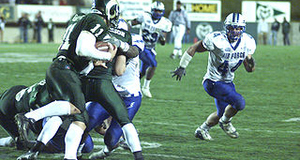Opinion:Not Just a Game: Sport and Society in the United States
By
2012, Vol. 4 No. 08 | pg. 1/1
KEYWORDS:
Sports are an essential and important aspect of American society; they are indispensible when it comes to their impact on a plethora of public arenas, including economics and the mass media. Sport coincides with community values and political agencies, as it attempts to define the morals and ethics attributed not only to athletes, but the totality of society as a whole. Fans of spectator sports find a reaffirmation of key societal values through sports, as they give meaning to their own lives. “By becoming fans, spectators engage in certain kinds of pleasures, fulfilling their own desires through fetishism, voyeurism, and narcissism," writes Brummett (21). Sports provide key dynamics when it comes to the augmentation of communal principles by enhancing the physical and mental well-being of individuals and the integration of social classes. The idea of “winning” in sports serves as a prime exemplar of success: a highly valued commodity which often results in elitism and superiority. The world of sports affords us the opportunity to gain vital insight into the sensitive issues of racism, sexism, and classism. Delaney writes, “to ignore sport is to ignore a significant aspect of any society and its culture" (7), continuing to note, “sport is the opiate of the masses, due to the fact that we are in the age of the sport consumer, which is dissimilar to the age of the sport spectator" (Delaney, 14). By placing a “value” on a specific athlete, you are not only defining that athlete based on his or her attributes, you are bestowing upon them a specific worth which ultimately translates into the worth of that specific sport en masse, which is why we unjustly deem certain sports more imperative than others. The “Americanization” of sports is something that we, as both fans and consumers, rely on to provide us with not only a means of entertainment, but a method in which we can derive the hidden values embedded in competitors. The understanding of the “Americanization” of sports is crucial to encoding the unseen cultural and communal significance many athletes possess. The norms and standards of society go tainted by many athletes throughout the country, who believe that that American spectator sport acts as a platform for the expression of individual principles onto humanity. Society places value on competition, therefore value is placed on all sports and their participants.As a society, we construct “types” of athletes based on their economic and social value, which acts as a connotation for their overall significance to the universal spectator. The idea of “winning” is something that fuels competition, which in my view is one of America’s greatest vices; we compete not simply to enhance our own physical attributes, but to provide ourselves with a sense of achievement at the expense of another’s failure. Sports, like the film or television industry, has major financial repercussions which might not be as beneficial to the consumer as he or she may think; the passion fans share for their favorite team or player is getting in the way of what significance these “games” truly have. Are fans paying their hard earned money to be a part of an experience they place value upon, or is it simply to line the pockets of already overpaid athletes and business gurus? The New York Giants win the Super Bowl and a parade is thrown for the team as worshipping fans stand shoulder to shoulder in a small, enclosed street way hoping to get a glimpse of their favorite player, or any player for that matter. These fans act as a prime example as to why businesses, such as the National Football league, thrive on the unquestioned reliability of their consumers and enthusiasts. The New York Giants won the Super Bowl, great, but what does it all mean? Besides the financial upside for the NFL, what are the fans actually gaining besides the opportunity to cherish the athlete that is spending their own money? The athlete clearly benefits, so in my view, it is every professional athlete’s moral obligation to act as a role model for young kids and to give back to the community. If we, as a society, feel the urgent need to participate in and assign value to sports and competition, we must make sure that it is for all the right reasons. Many sports organizations are billion dollar businesses, but when the Super Bowl gets more viewers that the presidential race, is anyone really “winning?” When an athlete makes it to a professional level in any sport, their commitment and obligation to perform at a high level shouldn’t be simply desired by the fans, but expected. Televised sports, specifically, create assured fixations by commodifying athletes and their actions. Within the Steve Yzerman video, spectators and the media label him as a “hero” or the “model” athlete based on the fact that he was willing to play through a severe injury for the betterment of his team. Therefore, we place a higher “value” on a player like Yzerman, than on an athlete like Floyd “Money” Mayweather. Some may view Yzerman’s action as an act of stupidity which could’ve resulted in further injury, while others may deem him invaluable. I view athletes like Steve Yzerman and Derek Jeter as a commodity or product; someone who I invest money in to perform at a high level and win. Playing a hockey game injured or diving into the crowd is expected for a twenty-five million dollar paycheck. Some “casual” athletes perform not for financial gain or professional esteem, but simply as a way of living. Take Kathy Martin for example, who runs not just as sport, but as a way to improve her lifestyle and to become an inspiration for a younger generation. Athletes like Martin have no quandary when it comes to becoming a role model; she doesn’t need twenty-five million dollars to execute her craft at a high level. Martin places expectations and limitations on herself; she doesn’t have fans placing those expectations on her like certain professional athletes do, being that they are on television during a weekly basis. “The expression of “spectator sport” itself insists on seeing that which is viewed as a performance. Television and other media have their eye on sport precisely because sport and games are so highly performative (Brummett, 18).” I question why sports such as basketball and football are shoved down are throats by the media, while sports like the senior Olympics harbor little value in terms of communication by publication or broadcast. One can argue that because so much revenue is plugged into teams like the Yankees or Giants, fans feel obliged and compelled to watch them, whereas “low key” sports such as track simply cannot contrive that much revenue. This is due to the fact that they are rarely televised and the media following is virtually nonexistent compared to the popular spectator sports. I understand that placing a “value” on players is crucial in terms of essentially defining their worth within their respective organization; better athletes earn more because they’re simply a better commodity. Although I don’t believe that placing a “value” on sports themselves is imperative in terms of characterizing the importance of that specific sport. Athletes like Kathy Martin work just as hard as athletes like LebRon James; the difference is that she does it for an empty pocket and diminutive admiration. Contemporary sports sociology theories can ultimately be assigned to sport, assessment, and the placement value on athletes. “Functionalism views society as an organized system of interrelated parts that seek equilibrium. Sports can play a vital role in maintaining such balance (Delaney, 36).” One can argue that sports counteract religious morals; guarding society from bleak realities and instilling a false sense of achievement. The world of sports encourages commercialism, sexism, and most importantly, nationalism. “The Iraqi national soccer team ultimately became an agency of national identity and pride for their country (Brummett, 12).” Many argue that the Iraqi soccer team help tackle the issues of terrorism in Iraq, as even the media was depicting their “heroism.” Overall, it is essential that we examine sports from both a business and societal viewpoint before we view them as spectators or fans. Sport is a human institution, a universal phenomenon which serves to instill a sense of belonging or meaning to many individuals lives. Let us not place value on athletes, let us place value on the impact their profession has on humanity; the realization of athletes as commodities and sport as a political and pecuniary service will help reshape the perception that sport is merely a means of amusement and diversion from personal hardships. Our world can exist without the arrogance and egotism attributed to certain athletes, and it can surely exist without the barefaced disregard several sport organizations have for their dedicated fan base. But, we may question whether or not this world can function without the hidden values embedded in competitors and the communal insight sports give us on a national scale. ReferencesBrummett, B. (2009). Sporting rhetoric: performance, games, and politics. New York: Peter Lang. Delaney, T. (2009). The Sociology of Sport. The Sociology of Sports: An Introduction (pp. 3-21). US: McFarland. Suggested Reading from Inquiries Journal
Inquiries Journal provides undergraduate and graduate students around the world a platform for the wide dissemination of academic work over a range of core disciplines. Representing the work of students from hundreds of institutions around the globe, Inquiries Journal's large database of academic articles is completely free. Learn more | Blog | Submit Latest in Sociology |


















